#ancient order of romulus
Explore tagged Tumblr posts
Text

•| ᴛʜᴇ ꜰᴏʀɢᴏᴛᴛᴇɴ |•
Content : Blood, deaths, injury.
A/N : This is the prologue, I only have three chapter written so far but at the second I get my wifi back I’m getting into writing. Hope y’all like it. (Minors can interact).
•| ᴘʀᴏʟᴏɢᴜᴇ |•

Rome was built on blood. And you were the hand that spilled it.
THERE ARE STORIES CARVED INTO THE BONES OF THE EARTH, whispered through the winds that sweep across ancient ruins. Tales of glory and conquest, of gods and mortals entwined in fate’s cruel embrace. The foundation of Rome is one such tale—a story of two brothers, bound by blood and divided by destiny. But as with all legends, there are truths buried beneath the myth. Forgotten truths.
They say Romulus built Rome, that he was chosen by the gods to raise its walls and reign as its first king. They do not speak of the blood spilled to make that city rise. They do not speak of the brother he killed to crown himself in glory.
There were once two brothers.
Romulus was the elder—clever and kind, the embodiment of law and order. He dreamed of empire, of power forged in marble and blood. He believed in destiny, a thread spun by the gods that he alone was meant to hold. He was a man of ambition, of unyielding will, a figure carved from Vesta.
And then there was Remus.
Wild and untamed, like a storm that could never be captured. His laughter echoed through the forests, and his rebellion burned brighter than any hearth fire. He saw the world not as it was, but as it could be—free from chains, free from the gods’ cruel games. Where Romulus sought order, Remus sought freedom. Where Romulus spoke of duty, Remus spoke of love.
And you—
You were a thread woven between them. Promised to Romulus, a symbol of unity and strength. But your heart… your heart belonged to Remus. From the moment you met him, you were lost to him. He was the untamed sky, and you were a restless sea, drawn to his wildness, to the way he saw you—not as a pawn in a king’s game, but as something free.
For a time, you believed love could overcome fate. That you could be more than what the gods decreed. But love, like all things, demanded a price.
When the brothers stood on the banks of the Tiber, planning their city, it was not the gods who chose the victor. It was betrayal. It was blood.
It began as a game. The brothers sought a sign from the gods to determine who would build their city on which hill. Romulus stood on the Palatine, and Remus on the Aventine. Romulus claimed twelve ravens flew above him, a symbol of divine favor. Remus, desperate not to lose, lied—saying six ravens flew above him first, trying to claim the gods had spoken to him before they turned to Romulus.
Romulus saw through the lie, and his heart hardened.
To Romulus, the betrayal was unforgivable. His brother had not only tried to take the city meant for him but had tarnished the will of the gods. The gods had chosen Romulus, and in Remus’s defiance, he saw rebellion, chaos—a threat to everything he dreamed of building.
When Remus leapt mockingly over the boundary Romulus had marked for the city walls, Romulus saw not a jest, but a challenge. His sword met his brother’s heart before the laughter faded from Remus’s lips.
Romulus knelt over his fallen brother, his hands stained with blood. He did not weep. He whispered words of duty, of sacrifice, convincing himself that this was what the gods demanded.
But Romulus hadn’t struck his brother down only for his mockery. He had seen you with Remus, seen the way you looked at him with love meant only for a husband. His rage was not born of ambition alone—it was born of betrayal. His brother had taken what was his.
The gods watched as Remus fell to the earth, his blood seeping into the soil that would one day grow Rome. They watched as you wept over his broken body, as your cries pierced the heavens and as your body was thrown into the Tiber. But the gods are cruel, and they do not weep for mortals.
For your infidelity, they cursed you.
You would be the goddess of legends, doomed to remember the forgotten brother. While the world praised Romulus, calling him the founder of Rome, you would walk the earth, whispering stories of Remus to those who cared to listen. His name would fade from history, but it would never fade from your lips.
You became a wanderer, a keeper of forgotten truths. You roamed the ruins of Rome, tracing the paths you once walked with Remus. You stood by the Tiber where he fell, your fingers brushing the reeds as if they still held his blood. You told his story to passing travelers, to poets and dreamers, hoping that someone—anyone—would remember him.
Centuries passed. Empires rose and fell. But your curse endured. The world forgot Remus, praising the greatness of Rome, built on his bones. Romulus was remembered as a hero, while Remus became nothing more than a whisper on the wind.
But legends are never truly lost.
The gods are cruel, but fate is crueler. Time is a circle, and stories never end—they simply begin again. The soul of Remus, restless and wild, could not be bound by death. He would be reborn, again and again, destined to cross paths with you across the ages.
And now, in the heart of Rome’s empire, he lives once more.
He is not a prince or a king this time. He is no longer a man of noble birth, destined to build cities. He is a gladiator, a slave, bound in chains, his body scarred by the lash and his heart hardened by loss. But his eyes—those storm-blue eyes—are the same.
You see him in the Colosseum, fighting for his life with the same reckless abandon that once made you love him. His name is no longer Remus. He is Anakin now—a man forgotten by the gods, but not by you.
You watch him from the shadows, aching with the weight of centuries. You want to reach out, to call his name, to tell him that you remember. That you have always remembered. But the gods are watching, and they will not forgive you for defying them again.
Still, you cannot stay away.
Your paths will cross. They must. The gods may curse you, but they cannot erase what was written into the stars.
Rome was built on blood, on betrayal, on love lost and found. And as you stood among its ruins, you knew that history will repeat itself. The immortal and the reincarnated. The forgotten brother and the wandering soul.
But heroism was not your fate.
And what nobody knew, was that before the creation of Rome and before their names were changed by layers of history, the brothers true Jedi names, the one they were born with as simple mortals…were Anakin and Obi-Wan.

#hayden christensen#anakin skywalker#anakin skywalker fanfiction#anakin skywalker x reader#anakin skywalker x you#anakin skywalker x female reader#anakin x you#anakin x reader#evie writes
136 notes
·
View notes
Text
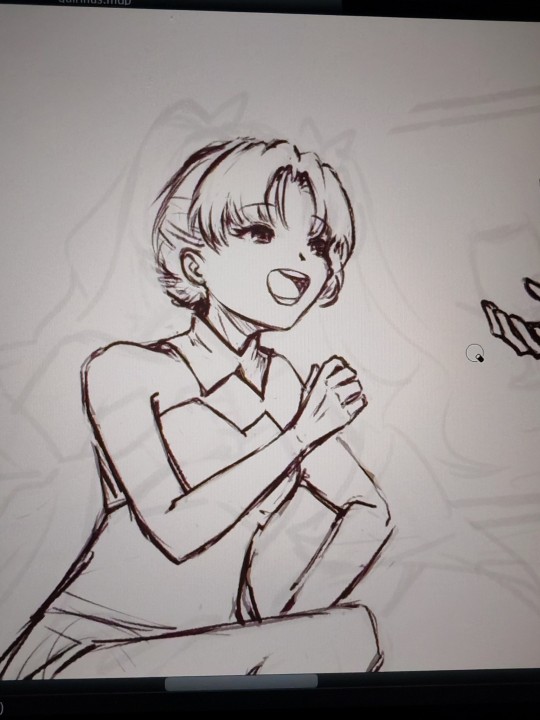
accidental short haired eresh
save me accidental short haired eresh..

Just the two best lancers I own hanging out and having a great time bonding over being ancient, often-hated and almost always misunderstood beings who just want normal lives. Just a relaxing girls' day at the beach doing what anyone would enjoy.
Art by the eternally delightful @wishem
#commissions#op's tags:#this definitely isn't because Romulus=Quirinius wasted a bunch of SQ and I'm still bitter#or rather that's exactly what happened but during the art process I started shipping these two for real#I like to think Yu appreciates having someone she can talk to who understands what she's been through to a degree#meanwhile Xu Fu is begging Ishtar to teach her the ancient Babylonian seduction magic Eresh is obviously using on Yu#Ishtar is concerningly willing to teach her everything she knows about love#Ritsuka and Skadi are conspiring to keep Xiang Yu in the field as much as possible#because this is way more entertaining than anything in Chaldea's media servers#end of op's tags#ereshkigal#yu mei ren#consort yu#fate#fate grand order#fgo#my art
93 notes
·
View notes
Text
NAME IMPORTANCE IN SANDERS SIDES
Guysssss, I just realised something and it might have already been talked about but I couldn't find anything so I'm writing it now. So, we all know about the name reveals in Sanders Sides, their meanings and their importance, but I was casually watching through the series again when in Selfishness VS Selflessness I realised something that I have been noticing before but not knowing why. The moment Deceit, Janus, talks to Anxiety, Virgil, and brings up Virgil's reluctance to share his name. And that scene has always stood out to me in someway but now I finally realised why. Because Janus lied. It's not something new, he's literally Deceit, BUT it's what he's lying about that is important.
Janus: "Oh, so you've never been reluctant to share anything with the group then?"
Virgil: "Don't"
Janus: "What? I just meant your name"
Virgil: "DON'T!"
JANUS IS LYING YET BEING TRUTHFUL ABOUT HIS RESPONSE!!! THAT'S THE BEST WAY TO LIE, TO ALSO BE TRUTHFUL!
We may think, even assume, that Janus is talking about Virgil not telling his name to Thomas for a long time before finally revealing his name to be Virgil. BUT Virgil's reaction is too emotional, too strong, too desperate to be only about that. It's more like he's pleading Janus not to reveal something. And it would be ignorant not to include the fact that there's A LOT of theories about when Virgil was a "dark side" he was not Anxiety but Paranoia.
And now to the point I wanted to talk about. Names, their meanings and their importance. So let me list their names in chronological order they were revealed so you can see them clearly.
Logan
Roman
Patton
Virgil
Remus
Janus
And of course the orange side we do not know of yet. But look closely at the list of names. And do you remember what Patton said when Virgil revealed his name? "Huh, but that doesn't end with a -N"
And now look at the "dark sides" and their names. They end with -US. Do you see the the name that doesn't really fit in?
VIRGIL
AND I BELIEVE THAT IS BECAUSE IT'S NOT HIS "REAL" OR "TRUE" NAME BUT CHOSEN NAME!! Virgil means protector, that is what Virgil want to be for Thomas! Virgil doesn't want to be Paranoia, he doesn't want to be the bad guy. HE WANTS TO BE A PROTECTOR! And that is why he chose that name!
AND THAT'S NOT ALL!
Let's look at the name etymology here too!!
For the "Good sides" their names correspond with Aristotle's ingredients for persuasion, albeit Roman's name is not visibly linked to its correspondence like the others.
Logan - Logos
Roman - Ethos (Roman being the side with charm and scene presence)
Patton - Pathos
And now for the "Dark sides" we know of. Their names are derived from roman mythology.
Remus - Twin brother of Romulus, the founder of Rome which corresponds Remus being Roman's twin, since Roman's name is basically taken from the ROMAN EMPIRE as well as Romance and all. Plus it also places great significance that Remus is only an offshot of Roman, without Roman, Remus would not exist and therefore his name corresponds to "the twin brother of the great mythological founder of ROME"
Janus - God of doorways, duality, gates, passages, beginnings and endings, always depicted as two-faced. Two-faced=Deceitful
AND WHAT ABOUT VIRGIL'S NAME? DOES HIS NAME FIT INTO THESE CATEGORIES? NO! VIRGIL IS NOT FROM ROMAN MYTHOLOGY NOR ARISTOTLE'S PERSUASION! IT'S A SIMPLE ROMAN NAME, THE MOST WE CAN FIND IS THAT AN ANCIENT ROMAN POET HAD THE NAME VIRGIL. WHICH IN ALL HONESTY FITS ROMAN SANDERS MORE THAN VIRGIL. AND I BELIEVE IT'S BECAUSE DESPITE EVERYTHING VIRGIL WANTS TO KINDA BE LIKE ROMAN TO THOMAS, HIS HERO. ROMAN IS THOMAS' HERO AND VIRGIL WANTS TO BE THOMAS' PROTECTOR, HIS HERO!
SO IN CONCLUSION... I think Virgil's name is not the name he had before or his "true" name. It is his chosen name and that is what he wants to be. That's why it's different from the other sides' names. That's why Virgil has been so sensitive when Janus brought up his name and why Virgil has been sensitive about being called paranoid. Because that's basically someone he has been and not someone he wants to be. It's almost like being called by his dead-name. And this just makes me want to hug Virgil even more, feed him spider-shaped cookies, give him some calming tea and just.. be there
#sanders sides#virgil sanders#thomas sanders#logan sanders#fan theory#roman sanders#patton sanders#remus sanders#janus sanders#ts virgil#ts remus#ts janus#ts theories#ts roman#ts patton#thatsthat24#can you believe this started as just some skits#and now it's not only an amazing series with interesting storylines and characters#so much important mental health focus#but also so much depth#and let's not forget the amazing acting and work that goes behind it#I love sanders sides so much
40 notes
·
View notes
Text
Understanding Roman Legend

Numitor, king of Alba Longa, was dethroned and taken prisoner by his younger brother, Amulius, who, after killing his nephews, forced his niece Rhea Silvia to enter the temple of the Vestal Virgins so that she could not have offspring. But the god Mars and Rhea Silvia fell in love. Mars fathered the twins Romulus and Remus.

Mars and Rhea Silvia (1617) by Rubens. Liechtenstein Museum
Amulius, fearing that he would have two rivals in the future, ordered the newborns to be killed. The man in charge of the infanticide did not dare to do it but he placed the babies in a basket and left them to their fate in the Tiber River. The current carried the basket to a swamp called Velabrum, between the Palatine and Capitoline hills.
In the cave known as Lupercal they were suckled by a wolf called Luperca. According to Plutarch in 'Parallel Lives: Romulus', Luperca was the sacred animal of Mars.
Shortly afterwards they were found by the shepherd Faustulus, who was working for Amulius, so he knew very well who those babies were. He decided to secretly care for the children together with his wife Acca Larentia.

The Shepherd Faustulus bringing Romulus and Remus to his wife. Nicolas Mignard (1654) Dallas Museum of Art.
When they grew up did he reveal his true identity to them and they decided to do justice. They killed Amulius and freed their grandfather from prison, who was reinstated on his throne.
Why sons of Mars and not of another god or a king?


Mars was the god of war and the army, virility, violence, revenge, and courage: all these attributes was the essence of Ancient Rome, rather the Roman army.
On the other hand, if the twins had been the sons of a man, even a king or a great warrior, they would have been ordinary men. That was a clear message to the Romans: they were not like the others; their army was not to be one among many.
Why a she-wolf?

The first food was not mother's milk or the milk of a tame animal but of a fearsome predator; A powerful message to the Romans about who they were, where they came from and where they should go. Engendered by the war, fed by ferocity; Their duty was to always be aggressive and feared by their enemies. Roman soldiers remembered at every step: “ We are sons of Mars and the Capitoline she-wolf”. And Rome, like the she-wolf called Luperca, was also capable of protecting its allies.
The foundation of Rome

The twins left their hometown of Alba Longa as they wanted to rule without overthrowing their grandfather. Romulus wanted to build a new city called Rome on the Palatine Hill, but Remus wanted to call it Remoria on the Aventine Hill. They decided that whoever saw the most vultures would win the dispute. Remus saw six and Romulus twelve.
According to tradition, Romulus founded Rome by drawing its sacred border on the afternoon of 21 April 753 BC.
Romulus had declared that no one could cross the borders of the city in arms; his brother disobeyed and crossed the limits carrying a sword, thus violating the sanctity of Rome. Romulus became enraged and a heated argument and subsequent armed confrontation began between the twins. Remus was seriously wounded and died hours later. Romulus held a funeral for his brother and buried his remains at the place where Remus had wanted to found his city Remoria.
Why a story about twins?

Romulus and Remus (1615) by Rubens. Capitoline Museums
The fact that they were twins, and not an older and a younger brother, was to make it clear that the god Mars was the father of both, and that they were 100% brothers.
So there was no doubt that Romulus and Remus represented all Romans, both in good times, when they were united and fighting for a common cause, and in times of division and conflict.
The fratricide was not premeditated. The fight was not for ambition or for a woman, it was for Rome. This story taught that, for the good of Rome, civil wars could be fought, as many as necessary.

Romulus and Remus. Silver didrachm (6.44 g). c. 269–266 BC. Photo: Curtius http://creativecommons.org/licenses/by-sa/3.0/
87 notes
·
View notes
Text
Rick is known to mirror myths a lot (Silena-Clarisse and Patroclus-Achilles, Polyphemus' cave, Hercules' labors, etc) He could and SHOULD have mirrored the Trojan war in HOO.
Let me set the scene. Gaea doesn't pop up until the last couple books. It's easy to be scared of something that is mentioned but not seen, which in my opinion, is why Gaea in the HOO books just wasn't scary enough.
So the antagonists in the first few books are the Giants working under Gaea's orders. Percy is kidnapped by them and given to the Romans in the hope that the Greeks and the Romans will go batshit crazy in a fight and forget all about the prophecy of the seven and destroying Gaea or whatever.
Camp Halfblood is fully ready for war. As soon as they find out (through an oracle or smth idk) that the Romans exist and they have Percy, not even Chiron can stop them. Percy is the hero of the Battle of Manhattan, of course, and the hero mentioned in the last great prophecy. He's like their modern Aristos Achaion.
Meanwhile, the Romans have no clue what's going on. There's this guy he's funny, he has no memories, he just shows up at their wolf goddess and trains and gets sent to them. Cool.
Juno can't stand to see New Rome be attacked. Whether or not they would win is a whole different story. So she plucks Jason from CJ and brings them to the Greeks just for some sort of a balance.
This mirrors the Trojan war in the sense that Troy was a fortified city, so is New Rome with tons of forts and walls. Aeneas' lineage went on to be Remus and Romulus, the founders of Rome. And Helen of Troy was stolen from the Greeks.
Anyway so there's that conflict, but at the same time Camp Halfblood is getting ready to attack, Jason, Piper and Leo get sent on a quest to rescue Hera who has been captured by Porphyrion and Enceladus.
On the way, Jason starts to regain his memory a little bit, though he doesn't know everything yet. He's still super conflicted with everything. A pretty girl thinks they were dating, Leo says they were best friends, Annabeth says the Romans are enemies. But whom should he really believe?
Piper's whole arc through the first book could be about how she's the daughter of the goddess of beauty, she wrongly assumes her fake crush on Jason was her mom's fault. And she's learned so much bad stuff about her mom from myths, she outright rejects feminity and anything remotely girly at first but then slowly she gets to know Aphrodite isn't as bad as some myths make her out to be. Bonding and shit bc why should Poseidon be the only present godly parent?
Leo, meanwhile, has no idea he can essentially fire bend in the first book. His arc could be about discovering his mother's death was his fault, slightly and coming to terms with it with the help of his friends.
Reyna on the Roman's side is freaking out bc Octavian wants to go to war with the Greeks who are close to attacking them, there's a strange dude who keeps trying to pick fights with gods, a horse girl and not to mention monsters won't fucking DIE.
SON trio go on their quest to Alaska to kill Alcyoneus/ release Thanatos and things are getting clearer to them as well. Just when the Greeks are about to attack on CJ, Polybotes and the monsters attack as well. Somehow, both sides end up fighting the monsters together.
They're not friends, but they're not enemies either, bc Percy is reunited with his gf and Jason is returned to his home.
The Roman senate and the Greeks somehow come to the same conclusions- that a quest needs to go to their ancient lands. Over the next few months the work of the Argo II commences.
Things seem smooth for a while. But Gaea grows restless. She poisons Octavian and manipulates him through dreams and stuff like Kronos did to Luke. As is the nature of most Roman emperors, Octavian overthrows Reyna and declares himself the leader of New Rome like his namesake Octavius Caesar. (HAHA! HISTORY PARALLEL BITCHES)
This puts the actual quest on hold bc the seven now need to find the Athena Parthenos to bring together the Greeks and the Romans and to stop Octavian's plan of trying to fuck as much shit up as possible.
Reyna, Nico and say idk, Grover, are the ones to deviate from the quest and bring the statue to USA again. But the Seven are still very much in Europe after rescuing Nico.
Percy and Annabeth fall into Tartarus which helps close the Doors of Death, except this time since Nico isn't there, Hazel has to take on control over ghosts and the dead in the House of Hades and leading up to it. The powers of mist, in my opinion, should have gone to Piper since charmspeaking is a lot like bending the mist verbally.
Piper's arc through the third and fourth book is starting to discover herself and with the help of her mother, figuring out she doesn't like Jason romantically like she thought she did.
Hazel's arc is gaining control over what she once was (dead). She's jealous her dad was there more for Nico than her, but she pushes past it and never lets her anger and grudges get the better of her which is like breaking boundaries for children of Hades/Pluto.
Frank's arc in HOH was really cool, I like that. So no change to that.
Jason, poor guy is still very much confused about everything really. He's used to being the leader, he feels lost in the large group. He has his moments to shine ofc (please take away his excess amounts of head injuries), but he starts to feel inferior, which is where Leo helps him bc the guy knows what that's like.
Anyway, in the absence of Percy and Annabeth, Jason has to take charge. He discovers he doesn't really like it. That's not what he was meant for even though he had greatness thrust upon him at a very young age.
His BOO arc is earlier this time and takes place throughout HOH and BOO. He's content with himself, even if he isn't with anyone. HE'S THE ONE THAT GETS SENT TO OGYGIA!!!
And Calypso eventually does fall for him bc he's smart, nice, and just an overall swell guy. But he helps her to realize that she can be content in herself as well. And he promises her that he'll help her.
Show me Leo, Jason and Percy trying to think of ways of helping the goddess.
In any case. BOO could have been like Iliad pt 2 also known as the Odyssey. It takes them the whole book just to get to Athens. Meanwhile, they've understood that Gaea is the main main villain. She's even raised some of the other primordials against them.
Percy and Annabeth already saw Tartarus, and then there's Oceanus who makes their travel much harder than necessary. Something something about how they get tossed all over the place and somehow manage to gather all the correct ingredients for the potion (i forgot the name lol) on their small adventures in the different places. In the end they finally make it to Athens. Except this time, there's only a few giants there bc they killed the rest before.
Annabeth and Percy are taken hostage, like it happens in the books, but PERCY WILLINGLY GIVES UP HIS BLOOD TO RAISE GAEA RATHER THAN LETTING ANNABETH GET HURT BC OF HIS FATAL FLAW LIKE ATHENA TOLD HIM WOULD HAPPEN EVENTUALLY!!
The Gods DON'T SHOW UP PLEASE!! That was so lameee. Why even do the whole quest if their mommies and daddies were going to show up to help them????
So while Percy and Annabeth are battling the remaining few Giants, Leo, Piper, Hazel and Frank go up against Gaia herself. In the old myths four titans held Ouranos down while Kronos chopped his essence up. In the same way, they battle Gaia away from her turf in the air, keeping her distracted enough. All these demigods are needed because she's a primordial dammit!
Jason, my guy, comes in a clutch, chops her to pieces and sends her essence to Tartarus!!
The world is saved, the end!
#percy jackson pjo#percy jackson#percy jackon and the olympians#hoo#heroes of olympus rewrite#heroes of olympus#jason grace#nico di angelo
187 notes
·
View notes
Text

"From a philosophical perspective, Gemini is a classroom of souls in which divine knowledge is imparted. In this sign there is a sacred renunciation and a spiritual transcendence occurs towards the heavenly world. The living, collective spirit of the planet Mercury is a protector of our mankind. This celestial body – the closest to the Sun – is esoterically associated with the Buddha and eternal wisdom."
“Isis Unveiled”, by H. P. Blavatsky, volume II, p. 132.
GEMINI (May 21 - June 20)
In a time so long ago that it barely lingers in the memory of aged medicine men, two sons were born to Sun-Carrier and his consort Changing Woman. They were Nayanezgani and Thohadzistshini, who overthrew the monstrous ones and brought an end to the Age of Giants. They heralded a new race and ushered in the Fourth World, where every colour existed and a snow-covered mountain stood at each of the four cardinal points. The Navajo say that four gods created the first man and woman from ears of corn. To this pair came five births of twins, the first of which were hermaphrodites. The four that followed intermarried with the Mirage People who dwell in this world. Their children slowly forgot their ancestry and even failed to see the significance of the birth of twins.
The heavenly twins of every mythology have some striking affinities. The sons of Sun-Carrier and Changing Woman are reminiscent of those of Adam and Eve or Zeus and Leda. Sometimes they are male and female offspring, standing like two pillars side by side. They, like the Navajo brothers, are symbols of the brilliant white and red stars which for thousands of years have been identified as 'the Twins.' The pillars of Hermes and Hercules, as well as Jachin and Boaz at the entrance to Solomon's temple, are derived from the great myth of Gemini. The glyph that describes them all is a graphic indication of their nature: two columns supporting a crossbeam over a threshold. Used in this form by the ancient Spartans, the glyph was later translated into the image of two amphorae with snakes twined around them. The glyph stands for the Portal of the Temple of Humanity. The ancient Euphrateans called the twins Mun-Ga, which designates 'the making of bricks' and refers to the building of the City of Man. Similarly, Romulus and Remus, who despite their differences, built 'the Holy City' of Rome stone by stone, reflect a conception of the temple of humanity common in Mediterranean cultures. Gemini is also associated with fertility, and Finno-Ugric people still carry twins into the fields to ensure an abundance of crops. The celestial twins suggest a link between the evolving human vehicle and the increase of life in general through the divided, overbrooding Spirit, which quickens the processes of division and fructification.
Like Romulus and Remus, the twins of legend and sacred lore are often in opposition to one another. They may, like the brothers depicted in the Cahuilla creation myth, separate to their respective positions in the nether and upper worlds. Or, like Odin and Ollerus of Eddie mythology, they may alternate with one another, representing summer and winter and other cyclic patterns. They maybe like the twin warriors who embody the ever-contending forces of creation and destruction, life and death, their struggle being the cause of all change. They precipitate externally the nature inherent in Changing Woman and bring face-to-face with itself the duality intrinsic to manifestation.
Gemini may describe two hostile brothers, but in Hindu and Egyptian tradition the twins are brother and sister. In The Book of Knowing the Evolutions of Ra, which describes the nature and exploits of the children of the Creator Temu, Shu and Tefnut are described as the right and left eye of Ra. Their father Temu declared the twin birth: "Thus from being one god I became three out of myself." Shu and Tefnut, side by side, represent the union of past and present, space and light, life and order. The Gate of the Pillars of Shu was recognized by Hierophants as the entrance to the Path. The divine nature of androgynous twins points to a state of wholeness which existed prior to the subsequent divisions of evolving existence. An occult analogy can be found in the process of fertilization of a single mother cell which produces, in human generation, identical twins. In such cases the ability to provide the entire complex genetic structure for multiple individuals lies within one fertilized egg. The psychic closeness that twins experience seems to mirror their monogenesis, as well as an even higher and more abstract form of sharing than any they experience on the physical plane. Coming from that which can reproduce itself, and seeming to move, think and feel as one person, twins have inspired philosophers from many cultures to see in them the first emanation of the Creative Logos.
The dual nature of Gemini, as the central theme of the symbol, is shown in various ways. If the twins represent the forces of creation and destruction or the upper and lower worlds, they are both loved and feared. Where the Finno-Ugric peoples rejoice at the birth of twins, some African peoples fear them. It is often said that Heaven kills as well as creates and is associated with the unexpected, like lightning and other awesome phenomena. With the birth of twins the unexpected occurs and they attract both good and evil. Knowing not which is which, some people abandon both in the forest. It is not always a simple task to tell Cain from Abel, and sometimes the dual nature of Gemini, which is usually present in single individuals, becomes separated out in two twins as though one were the dark shadow of the other. In modern times the extraordinary example of two French brothers seems to echo the ancient biblical crime. The innocent and virtuous brother was so repeatedly plagued by the perverse misdeeds of his twin that he finally lost control and in a fit of exasperation strangled him. The mystery as to why the good brother kills the evil one is compounded by the fact that in the biblical allegory the brother rejected by God kills the one accepted.
Whether good and evil, or both purely divine, the dual forces symbolized by the twins are inextricably bound together. As Manilius wrote, "Tender Gemini in strict embrace stand clos'd and smiling in each other's face." The Aswin twins of Hindu tradition are always together, guiding their horses through the heavens. In the Tarot cards the twins symbolized 'the Lovers' and their masculine and feminine activities are like two reflections of one will. The heavenly twins express opposites fused together, like twin beams from one light. The image of Castor and Pollux, seen by the Romans as the Double Light, was placed on the bow of ships in the belief that their dual presence could ify or blend the powerful negative and positive forces working during electrical storms at sea. Their salvific power was suggested in Shelley's translation of Homer's Hymn to Castor and Pollux:
Ye wild-eyed muses! sing the Twins of Jove,
. . . . . . . . mild Pollux, void of blame,
And steed-subduing Castor, heirs of fame.
These are the Powers who earth-born mortals save.
The Greeks and Romans often called the two brilliant stars of Gemini the Sons of Leda. Castor and Pollux were separately termed 'the Starry One' and 'the Lightful One,' names indicative of their respective natures. Castor symbolizes the Earth while Pollux is the emblem of Spirit, reminding us of the ancient edict which states that it takes Earth and Heavenly Waters to create a human soul. The Greek myth achieves its most sublime expression in Pindar's version. Leda is united in the same night with Tyndareus, King of Sparta, and with Zeus, King of the Olympian gods. From this dual union emerge two sons, the mortal Castor and his immortal brother, Pollux. Bound together by a common mother and intense fraternal devotion, they journey on adventures throughout the world. In a ferocious battle with the sons of Aphaereus, Idas, 'he who sees and knows,' mortally wounds Castor. Pollux finds his brother dying and appeals to his divine father to allow him to perish also. "Thou art of a divine race," Zeus replies, "Thou canst not die altogether." Nevertheless, just as the brothers have shared all things in life, they may both share death and immortality. Pollux gives a portion of his immortality to Castor, and thus the twins live alternately, one during the day, and the other at night, in the heavenly abodes. As an allusion to the evolutionary history of humanity, Castor represents the purely mortal man, unconscious in its personality and a mere animal until united with the immortal individuality, signified by Pollux. He is Manas, the informing fire of consciousness which transforms animal man by linking him to the immortal individuality, Atma-Buddhi. Lower man becomes conscious, and Higher Man can behold the world through his less favoured brother. Thus Castor symbolizes the egg-born Third Race humanity, unconscious until awakened to Manasic awareness by the informing god - Pollux.
Gemini is ruled by the planet Mercury, and the twins are often depicted as children using their budding intelligence to play life's game with a cleverness which mimics innocence. Gemini represents the forces of both the Higher and Lower Mind which when ideally combined result in an airy and mercurial balance of self-consciousness. Like the union of past and present symbolized in the Pillars of Shu, Gemini brings into emergence the delicately balanced confluence of the rivers of mind and matter. In China it is represented as an ape with dual qualities related to Yin and Yang, whereas in Tibetan Buddhism it is symbolized by a monkey climbing a flowered tree. The agile primate with his humanoid characteristics climbs upward to grasp the opening bloom of self-conscious intelligence. From this point the light of awareness will disperse through writing and education as well as the arts of commerce. Its benefactors will be many, and some great poets and thinkers attribute the source of their genius to Gemini. Hesiod wrote, "To them I owe, to them alone I owe, what of the seas, or of the stars I know," and Dante intoned:
O glorious stars,
O light impregnated - with mighty virtue,
From which I acknowledge - all my genius,
What-soe'er it be.
In occult tradition we are told that the source of this genius is the First Androgyne whose essence is eternal and who emanates a pure ethereal light. It is a dual light which is not perceptible to the physical sense but which carries the seed of the Dual Man. It is the Androgyne who completes man, "whose ethereal form is emanated by other divine, but far lower beings, who solidify the body with clay, or the 'dust of the ground.' ' The progressive manifestation of twins suggested here is reminiscent of a Babylonian account of creation which states that "In Heaven and Earth 'faithful twins' had been brought into being" who were all to be the gods of the three worlds.
Gemini as a symbol of the Higher and Lower Mind points to the process whereby the whole of evolving existence leads to the pivotal point inherent in the dual nature of man. The duality symbolized by and inherent in Gemini suggests the dynamic unity of the mind, the crucible of the Aquarian Age. Like the two amphorae encircled by serpents, Higher and Lower Mind have complementary functions. When separated, Kama Manas is the calculating mind which apes its superior twin, fantasizing images of the world which deny significant occult import to events, and ruled by projected desires rather than spiritual aspirations. As the shadow of Buddhi-Manas, it can concretize any conception and exploit spiritual language for its own inverted ends. Buddhi-Manas is ever indifferent to all but universal truths; it abstracts the formless core from the world of form, synthesizes the mathematical harmonics of the world of change into the one fundamental vibration which precedes and pervades every manifestation, and transcends every level of insight, each of which becomes a step on the stairway to pure Spirit. When Kama Manas is wedded to Buddhi-Manas, its relational side is weaned from the snares of tanha, the thirst for embodied experience, and it becomes the vehicle through which Buddhi-Manas can manifest in the world. Gemini represents the realignment of the inverted mind.
Emerson likened friends to diamonds and opals, the one pure and impenetrable, the other variegated. The adamantine Higher Mind is multi-faceted, reflecting every colour from within itself while remaining colourless. The opalescent Lower Mind reflects all the colours of the world because they are lodged within it. When brought together in fraternal friendship, Lower Mind is purified so that it picks up and refracts only the colours emitted by Higher Mind, pouring its light forth into the world. Lower Manas must achieve a philosophical negation - refusing to identify with name and form - so that Higher Mind may manifest. If the lower aspect of dual Mind is positive, the higher aspect must be negative. The Aquarian Path is the process of reversing these polarities. Then the potentiality of the Akashic light, contained in the crystalline amphora of Higher Mind, can reflect in the potency of the pristine astral light poured forth from the translucent amphora of the purified Lower Mind. Thus the two aspects of Mind stand in the same relationship as did the first awakened Third Race humanity to its spiritual Instructors.
Twins in the world are like witnesses to the archetypal transition from the wholeness of the androgynous race to the duality of the separation that marked the lighting-up of Manas, They are a testimony to this, though few of them actually divide the opposing forces of higher and lower consciousness. Usually they blend the two individually as well as collectively, although there are few cases where the divine and animal natures pit themselves against each other as two separate persons inexorably linked in a desperate struggle which can only end in the death of one or the other. But this too is a reflection of the inherent potential unleashed with the awakening of self-consciousness. Adam separated into Cain and Abel (male and female), who are his own 'allegorical permutations,' and from the seed of this First Androgyne issued that series of twins which would, like the Navajo hermaphrodites who married 'the Mirage People,' produce the mortals of the earth. The 'killing' at the archetypal level has to take place, for without this sacrifice there can be no descending issue. The killing on the worldly level is a shadow of this mythical 'crime.' In its own sad and convoluted way, this illustrates further the painful involvement of purity and wisdom with that which is steeped in the mire of ignorance.
In Isis Unveiled H. P. Blavatsky suggests that Adam, Cain and Abel can be likened to the sephirothal triad of Crown, Wisdom and Intelligence. Correlating the Sephiroth with the classical zodiac, it follows that Abel symbolizes Gemini, marking it as the point where pure creative force is divided in two, such that one half is elevated and the other half descends into the multiplicity of phenomena. Adam is the collective name for man and woman or Cain and Abel, indicating that the separation of the sexes is only being alluded to analogously at the stage of evolution depicted in the myth. All stories concerning a seemingly objectivized Eve separated from Adam or separated siblings are merely indicators of the potential which lies latent at the dawn of the Third Root Race. These allegories do not refer to beings of flesh but rather to states of consciousness embodied in the most ethereal garments. Abel, the female aspect of Adam, is 'killed' because it enters into generation, and this is done as sacrifice by Cain or Jehovah, the masculine and creative aspect. Adam itself is the androgynous issue of Adam Kadmon, the sexless and pure Unmanifesting Logos. The allegory in occultism describes the development of the First purely sexless Race, the inactive androgynous condition of the Second Race, and the emergence of the 'Separating Hermaphrodite' which marks the Third and last semi-spiritual Race. It is in subsequent races that woman and man separate further and come, increasingly, to fight the battle of the dual self each within herself or himself apart. There is a karmic reflection of the androgynous commingling of forces in the relationship existing between man and woman today. While the shedding of the blood of Abel symbolizes the sacrifice of virgin consciousness, thrice-blessed is he who realizes the synthesis of the long separated forces within himself and through his relations with others.
The Heavenly Twins of Gemini are beautifully typified by the Aswins, the divine charioteers of Hindu mythology. They are depicted riding in a golden car and possess many forms. They are "the bright harbingers of Ushas the dawn" and represent the transition from darkness to light, both cosmically and metaphysically. It is said that at one time the gods refused them access to a great sacrifice on the grounds that "they had been on too familiar terms with men." Identified with both heaven and earth, these divine twins can show a negative character, due to the alliance of light with darkness which they characterize. But when they sacrifice themselves as a bridge, like the reins they attach to their wild steeds, they are known as the Aswini-Kumaras, the reincarnating 'principles' in the Manvantara. Their natures are endlessly reflected in the manifestations of Gemini in the world, but also represent a great and sustained sacrifice which, in its earliest stages, the stars of Gemini channel into the cosmos.
In man, the dramatic manifestation of this is in objectivized, reflected intellect. The Nidana traditionally related to Gemini is Vijnana or 'I-consciousness.' Of the twelve Nidanas, the first and second have to do with the last life or the past, while the third or Vijnana has to do with this life and the present. Therefore its nature is very dependent upon the 'karma-formations' and the skandhas of consciousness predominating in the previous birth, which can be seen as a 'causal mind-base' for the present. As a phenomenon like any other, it arises through dependence upon conditions. Vijnana is the collective term for all evanescent mental states, and to understand it requires the raising of fundamental questions, such as "Why do we think that matter exists?" and "What is the cause of the illusion of objective consciousness?" In Buddhist philosophy this has been put in terms of a contrast between Absolute Mind which is changeless and unreal image-making which obscures the light of the Absolute Mind. This Mind is called alayamjnana and refers to stored consciousness, whereas the unreal image-making is a product of evolving consciousness or pravritti-vijnana.
According to the Yogacharya School, cosmic will produces effects stored in alayavijnana which result in potential touch, mental activity, feeling, perception and further extensions of will. This first transformation of consciousness from the Changeless is followed by a second involving the evolution of ego-consciousness out of Alaya. The third transformation completes the process and ushers in that condition where sense perceptions are wrongly interpreted as descriptive of objective and subjective worlds, each independent of the other. Here, built into the dynamic duality is a system of perpetual inversions which is the realm of phenomena, the endless house of mirrors. The focal point of the inversion is like the central aperture of an hourglass through which sand flows back and forth. Creative Nature (Natura naturans) and Created Nature (Natura naturata) endlessly intermingle, the one being like the wearer, the other like the mask. As in the Babylonian god Nergal, who has two heads and two sets of wings and eyes that can rest and act simultaneously, cause and effect merge in Gemini. They twist and turn and reflect, sending the soul through the Pillars of Shu. From Absolute Reality, the Self partakes of the relative reality belonging to the realm of the pure hermaphrodite, the divine Twins. But evolution demands full descent and the separated ego enters into a long passage through the realm of imputed reality where the unreal imagination has full sway and the memory of the divine Twins is barely discerned. The struggle between Reality and its shadow begins.
Like the original moment of a vow taken with the first light of self-awareness, Gemini recalls the beginning of the quest. It reminds us of the awesome struggle of humanity for eighteen million years, and it points to the purpose of our existence, which is to uplift nature and bring her back to self-conscious unity with the One. This process is intimated in The Secret Doctrine: "The universe hath a Ruler (Rulers collectively) set over it, which is called the WORD (Logos); the fabricating Spirit is its Queen: which two are the First Power after the ONE." These Two Inseparables remain in the Universe of Ideas so long as it lasts and then merge back into Parabrahm, the One Changeless Source which rests unmoved at the centre of the great zodiacal wheel.
Hermes, July 1977
Art: GEMINI by Johfra Bosschart,The Zodiac Series
53 notes
·
View notes
Text

Ancient Roman Silver Brooch of Romulus and Remus Found in Spain
The Department of Culture of the Generalitat Valenciana has recently announced the discovery of a rare silver brooch, depicting the iconic scene of Romulus and Remus being suckled by a she-wolf.
This remarkable artifact was discovered during excavations at Vilanova d’Alcolea, a site in Spain believed to have served as an ancient postal building during the Roman era. Archaeologists, led by Josep Carbó, made the discovery, describing it as an exceptional piece both for its rarity and quality.
Romulus and Remus, pivotal figures in Roman mythology, were twin brothers whose legendary tale forms the foundation myth of Rome and the Roman Kingdom. Born in Alba Longa to Rhea Silvia, the twins were the grandsons of the deposed King Numitor. Threatened by their potential claim to power, King Amulius, Numitor’s brother, ordered the infants to be abandoned on the banks of the Tiber River.
Legend has it that the twins were saved by a she-wolf who nursed them in a cave known as Lupercal, situated at the southwestern foot of the Palatine Hill in Rome. Upon discovering their true heritage, Romulus and Remus avenged their family and reinstated their grandfather, Numitor, as the rightful king. However, their story took a tragic turn when a dispute arose between the brothers, leading to Romulus committing fratricide against Remus. Romulus then went on to establish the city of Rome, solidifying his position as its first ruler.
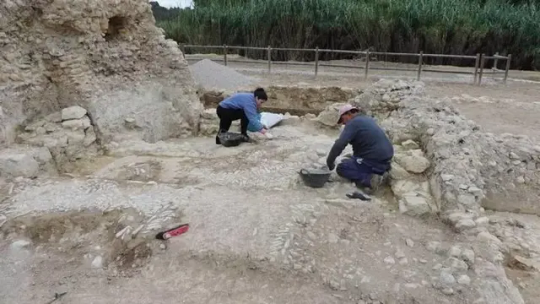
The silver brooch, measuring 4 centimeters in size and dating back to the 2nd century CE, portrays the iconic scene of the she-wolf nurturing the twins in their infancy. This depiction has become synonymous with the founding of Rome since the 3rd century BCE.
The archaeological site where the brooch was discovered holds additional significance. Situated near the Via Augusta, the longest Roman road in Roman Hispania, the site is believed to have been an official post of the Roman Empire, catering to officials and travelers alike. The proximity to this historic route enhances the importance of the find.
Archaeologist, Josep Carbó, emphasized the significance of the discovery, stating, “It is an exceptional piece due to its rarity and quality since there are very few pieces of this type that have been studied.”
By Dario Radley.
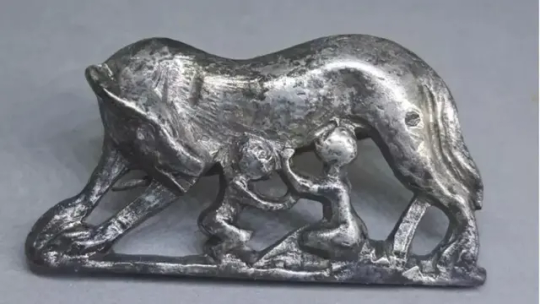
#Ancient Roman Silver Brooch of Romulus and Remus Found in Spain#Vilanova d’Alcolea#Via Augusta#silber#silver jewelry#ancient jewelry#ancient artifacts#archeology#archeolgst#history#history news#ancient history#ancient culture#ancient civilizations#roman history#roman empire#roman art#art#ancient art
285 notes
·
View notes
Photo

Romulus and Remus
In Roman mythology, Romulus and his twin brother Remus were the founders of the city of Rome. They were the children of Rhea Silvia and Mars (or in some variations the demi-god hero Hercules) and their story is recorded by many authors including Virgil who claims their birth and adventures were fated in order for Rome to be founded.
The Birth & Parentage of Romulus & Remus
Romulus and Remus were the direct descendants of Aeneas, whose fate-driven adventures to discover Italy are described by Virgil in The Aeneid. Romulus and Remus were related to Aeneas through their mother's father, Numitor. Numitor was a king of Alba Longa, an ancient city of Latium in central Italy, and father to Rhea Silvia. Before Romulus' and Remus' conception, Numitor's reign was usurped by Numitor's younger brother, Amulius. Amulius inherited control over Alba Longa's treasury with which he was able to dethrone Numitor and become king. Amulius, wishing to avoid any conflict of power, killed Numitor's male heirs and forced Rhea Silvia to become a Vestal Virgin. Vestal Virgins were priestesses of Vesta, patron goddess of the hearth; they were charged with keeping a sacred fire that was never to be extinguished and to take vows of chastity.
There is much debate and variation as to who was the father of Romulus and Remus. Some myths claim that Mars appeared and lay with Rhea Silvia; other myths attest that the demi-god hero Hercules was her partner. However, the author Livy claims that Rhea Silvia was in fact raped by an unknown man, but blamed her pregnancy on divine conception. In either case, Rhea Silvia was discovered to be pregnant and gave birth to her sons. It was custom that any Vestal Virgin betraying her vows of celibacy was condemned to death; the most common death sentence was to be buried alive. However, King Amulius, fearing the wrath of the paternal god (Mars or Hercules) did not wish to directly stain his hands with the mother's and children's blood. So, King Amulius imprisoned Rhea Silvia and ordered the twins' death by means of live burial, exposure, or being thrown into the Tiber River. He reasoned that if the twins were to die not by the sword but by the elements, he and his city would be saved from punishment by the gods. He ordered a servant to carry out the death sentence, but in every scenario of this myth, the servant takes pity on the twins and spares their lives. The servant, then, places the twins into a basket and onto the River Tiber; the river carries the boys to safety.
Continue reading...
68 notes
·
View notes
Text
Gladiator II Headcannons:
Tw: mention of illness, grief (implied), child abuse, historical inaccuracies in regards to ancient Numidian dating culture, definitely some level of grammatically incorrect
Caracalla:
Caracalla gets tremors in his hands sometimes when he's stressed. When they're really bad, he can feel it coming, and he ends up wearing larger tunics that cover his arms (are they tunics? idk) in order to hide it, because he's afraid that they make him look weaker.
He has a favourite pair of sandals that have lasted for a good four years
Has an irrational fear of dogs because when he was a toddler he saw his brother become sick from touching one. He doesn't remember this, but the feeling stays
Despite being both incredibly pale and ginger, he, for some reason, doesn't get sunburn
Has less allergies then Geta, and would have been seen as the healthier twin in he didn't contract syphilis
Whenever he wants to piss Geta off, he asks for food that he's allergic to so he can't have any.
When he was about 5, a praetorian let him hold a sword, and ever since then, he's claimed he knows how to wield a sword.
Geta:
Allergic to pine nuts, some types of fish and dogs- specifically borzois.
He orders this one cobbler to, under the threat of the execution of their entire family, remake the same pair of sandals at least once or twice a year, and then instructs them to give it to one of Caracalla's maids. This has been going on for about fourish years now.
Gets really bad hay-fever in the spring, most of the time he blames the symptoms on a hangover.
Clothes-wise, he basically has a massive shared wardrobe with his brother.
He came up with the adoption idea as a half-joke when (he says) he was drunk.
Really fucks with fur cloaks in the winter, most of which end up on his bed as a sort of makeshift weighted blanket.
Prefers winter to any other season
Macrinus:
Has known of the emperors since the reign of their father, but not of how they were raised.
Before Lucius recited Virgil, he tried to speak every single language he knew in front of him to try and see which ones he would recognise.
A small area in the garden of his villa is reserved for growing oranges, because he likes the smell when the trees bloom in the spring.
Absolutely loves language learning from a political standpoint, as the more languages he knows, the greater number of people he can have an influence over.
Has a borzoi called Gilgamesh
Fucks with Euripedes' plays to a worrying (for roman society) degree
He definitely fucks with Plato too
Acacius:
One of the reasons he persuaded Lucilla to get their borzois- Romulus and Remus- was because it would ward off at least one of the emperors
Loves markets and going to the forum
Secretly funds a greek wine merchant to keep supplies up throughout the year
He rolls around in bed and steals blankets, to the point where their shared bed is absolutely huge so Lucilla can actually sleep. The twins do not think that the bed is that big for this reason, though.
Really hopes that Lucius is somehow alive, because he's always wanted to be a father.
He feels slightly fond of Geta (it disgusts him to think this) but really hates Caracalla.
Speaking of his relationship with the twins, he heard rumors from some of his Praetorian friends that they were beaten as children, that Geta always had bruises until his father died.
Lucilla:
There's actually two reasons she got the dogs, but she hasn't told Acacius the other one.
The only thing she thinks the emperors have done well is installing the baths of Caracalla. Everything else is god awful.
Loves Greek wine
Sometimes, she feels bad for the emperors, but bad in a "oh no... oh well, not my problem" sort of way.
Fluent in at least 3 languages, and is learning more incase she needs to flee Rome (she's thinking of going to Greece, but she knows that she'll have to either go to India, China or Persia for political security).
Knows the doctors assigned to the emperors on a personal level.
She sees Lucius in every brown-haired boy she sees, every young man, every senator. She finds that despite her hatred for the roman political system, it has let her see her boy grow up through everyone else. She feels guilty after for 'replacing' her son.
Lucius:
Secretly a dog lover. He was promised a borzoi by Lucilla when he was a little older, but never got the chance.
Has had anxiety all his life, and has an "escape plan" in his head if they were to ever find him in Numidia
Finds repetitive tasks mundane- he had mixed feelings about farming, but he prefers it to fighting for his life in a gladiatoral arena every day.
Is as much as a wife guy as Acacius is, if not more.
At least bicurious
He can speak both Latin and Numidian, though he only knows how to read and write in Numidian.
His wife, when they were dating, taught him how to make bread, and he's done it as a grounding exercise ever since.
Ravi:
Not to assign roles or anything but I really think he's a girldad.
Before he knew that Lucius could speak Latin, he was going to offer to teach it to him
Will not buy his daughter a puppy no matter how much she asks (She gets one as her 7th birthday present...)
His wife is a low level socialite, to the point where, if they can marry their daughter off to the right family, then their grandson might be a senator. Despite this, Ravi doesn't care whatever happens to his daughter, he just wants her to be happy.
Gets weird dreams in the summer because of how hot it is in Rome compared to Londinium (Though, he did manage through British summer so maybe he's ok)
Adopts young gladiators (like, teenagers), and offers them a place to stay once they can leave.
Hates rhinos because animals aren't supposed to be that big
#tried to do seven for each character#anyway#emperor caracalla#emperor geta#caracalla and geta#macrinus#general acacius#lucilla gladiator#lucilla#lucius verus#ravi gladiator#gladiator ll#gladiator 2#gladiator ii spoilers#headcannons
9 notes
·
View notes
Note
Y'know, I came across your blog by happenstance and while I don't share the same set of beliefs, it is really cool from the point of folklore!
As a Romanian with a passion for mythology & folklore, I barely have surface knowledge of some of the more surface topics (strigoi, Solomonarul, Șolomanța sau Baba Dochia) and am looking forward to your posts :3
Hello! Thank you for tagging along!
I intend on making some more elaborate posts on these myths, but until then, here's the shortest introduction I could make on them:))
Strigoi: one of the many types of vampires that Romanians believe in. A strigoi is usually a reanimated corpse who prays on children mostly. When the infant mortality rate rose suddenly, people assumed it was because of a strigoi. They checked the grave of the suspect (a person who lived in sin), exhumed the body, and if it didn't have signs of decay, they found their strigoi. In order to deal with it, they would drive a stake through its chest or burn the body.
Solomonar: a weather-controlling wizard, with ties to the ancient myth of Zalmoxis (Dacian's supreme god). They go to the mythical school Șolomanța, where they learn and hone their craft. Theh ride zmei or balauri (types of dragons), that have the power to bring storms. It is said that they lived amongst people as beggars, and would target the people who treated them badly. However, their spells could be countered by specialized practitioners.
Baba Dochia: there are 2 quite different versions of her myth, but both pretty widespread. 1st: Dochia was the daughter of Dacia's last king, Decebal. When the Romans conquered Dacia, emperor Trajan fell in love with her and decided to pursue her. Afraid, Dochia fled with her flock of sheep in the mountains, but the emperor kept following. Knowing she won't be able to escape, she prayed to Zalmoxis for help. He turned her and her sheep to stone (similar with the myth of Apollo and Daphne). 2nd: Baba Dochia was a very sour old lady, whose son, Dragobete, got married against her will. She couldn't stand her daughter-in-law, so she gave her an impossible task: in a freezing day of winter, she had to go to a river and wash some black wool until it turned white. The girl went to the river, but knowing she won't be able to return home without completing this task, she started crying. Jesus saw the scene, so he came to Earth to give her a red flower, and intructed her to wash the wool with it. The girl, not recognizing Jesus, did as told, and the wool turned white. When she returned, Baba Dochia couldn't believe it. After hearing the girl's story, she thought spring finally came, since the girl got said flower. So she left for the mountains dressed in 9 coats. As she was walking, each day got warmer, so each day she shed one coat. After the 9th day, when she took off her final coat, the weather changed suddenly, and Baba Dochia froze to death. This is the basis for a Romanian spring holiday: first 9 days of march are called Babe / Old Ladies. Before March 1st, everyone chooses blindly one of those 9 days. Depending on the weather of the chosen day, your year will be either good or bad.
Even if Baba Dochia's segment is a bit longer, these are still just introductions. Hope they helped! If anyone is interested in reading more about Romanian folklore and mythology, I recommend these books:
Vulcănescu, Romulus (1987). "Mitologie română". (in Romanian)
Olteanu, Antoaneta (2023). "Mitologie română". Vol. 1-3 (in Romanian)
Anything by Simion Florea Marian
Pamfilie, Tudor (1914). "Sărbătorile la români" (in Romanian)
Chelariu, Ana (2023). "Romanian Folklore and its Archaic Heritage" (in English)
Rămâi curat, luminat, ca argintul strecurat!
#romania#romanian witch#folk magic#romanian folk magic#romanian folk witchcraft#romanian folklore#strigoi#solomonar#baba Dochia
8 notes
·
View notes
Text
N3r0 - Project Shinzon
[Non-Canon AU idea]
The Romulan infiltration unit set up Project Shinzon (named after an ancient Romulan God of Deception) - an attempt to replace the entire Starfleet command structure with clones.
Amongst them was unit N3R0

Each clone was "flash" grown - accelerated with the risk of premature ageing.
All clones were programmed with a fanatical loyalty to the Romulan people, advanced tactics & subterfuge, personal information, and their target brain patterns (obtained surreptitiously)

The first batch included many Admirals and fleet Captains. However the initial programming proved to be unstable.
Certain admirals made terrible decisions that immediately ended their careers. Fortunately no one discovered they were clones.
The next batches had far better programming.

So called "Mad Admirals" were a waste of the program - it was a miracle their cover had not been blown.
Although the later batches proved faultless, the highest levels of the Romulan State gave its order - Project Shinzon and all the clones must be liquidated
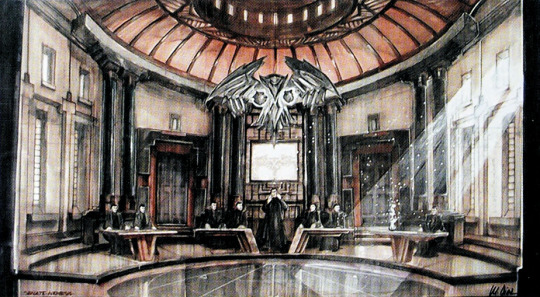
All project records, facilities, personnel and clones were all destroyed. Nothing escaped the purge...
Except for clone N3R0, the latest and most advanced of all the clones. Following his escape, and a little plastic surgery, he blended into the population and vanished.
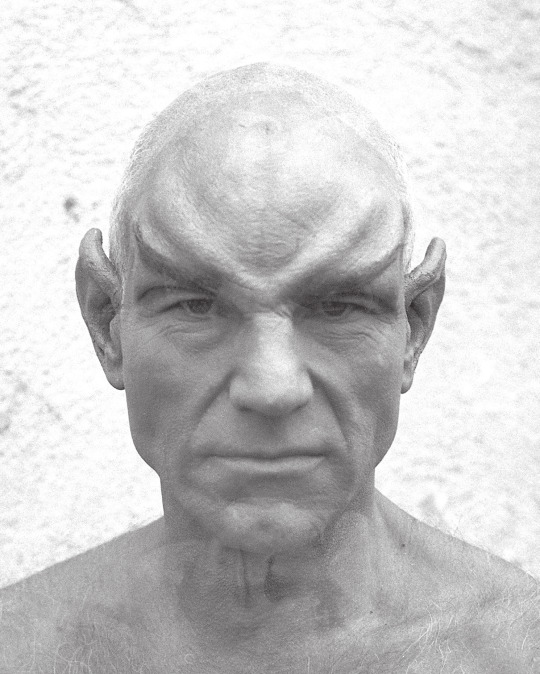
Now going by the name "Nero" (a name from one of the smaller equatorial continents), he became a rising star in first local than national politics. His debating and diplomacy skills were second to none. Those opponents he could not win over, were taken out with "natural causes".

Soon Nero had ascended to the highest office of all - Praetor. His enemies defeated, his future secured.
But clones cannot last forever and a significant amount of material and fluids from his originator was needed to extend his life. Picard must be lured to Romulus.
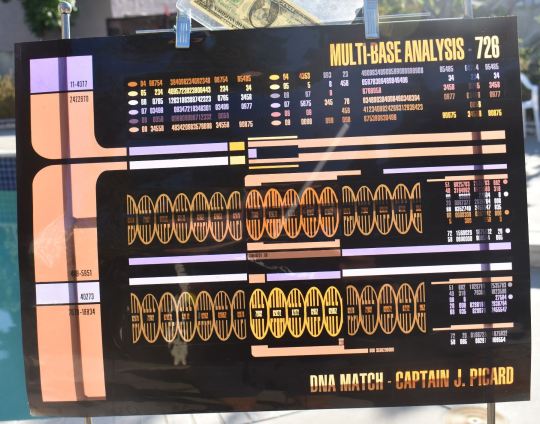
After the Cardassian Incident, Starfleet was much more wary of sending Picard on missions beyond the Enterprise.
So a scenario must be created for Picard and the Enterprise to come to Romulus. Entry to the Federation.

For this to be feasible, Romulus had to change. The people's dissatisfaction with the old guard's handling of the Dominion had allowed Nero to remove them all and replace them with younger idealistic senators.
A great many reforms made the Empire more palatable to the Federation

Even the underground Logic movement was welcomed into the light - there would be no more persecutions under the benevolent Nero.
The Tal Shiar was seemingly disbanded for "a government should not fear its own people", but they were instead secretly redeployed to a hidden fleet.


Senators were sent to the federation to begin the talks.

With the subterfuge in place, Picard was chosen as the envoy - the only Starfleet officer and diplomat with any real experience of Romulus itself.
The Enterprise D ( newly refitted after Veridian III ) was dispatched.

The trap was sprung, but failed to ensnare Picard for he had allies on Romulus - Spock and his Logicians
Nero was exposed as a clone - a most heinous of things to the Romulan people and fled aboard his flagship. Oddly his anger was focused only on Spock, not Picard his double.


Years later when Spock tried to save Romulus from the warp accelerated supernova, Nero returned.
He blamed Spock for tipping the balance in favour of his equal Picard, and sought to destroy Spock's ship.
Nero did not know of Spock's mission, and so Romulus was destroyed.
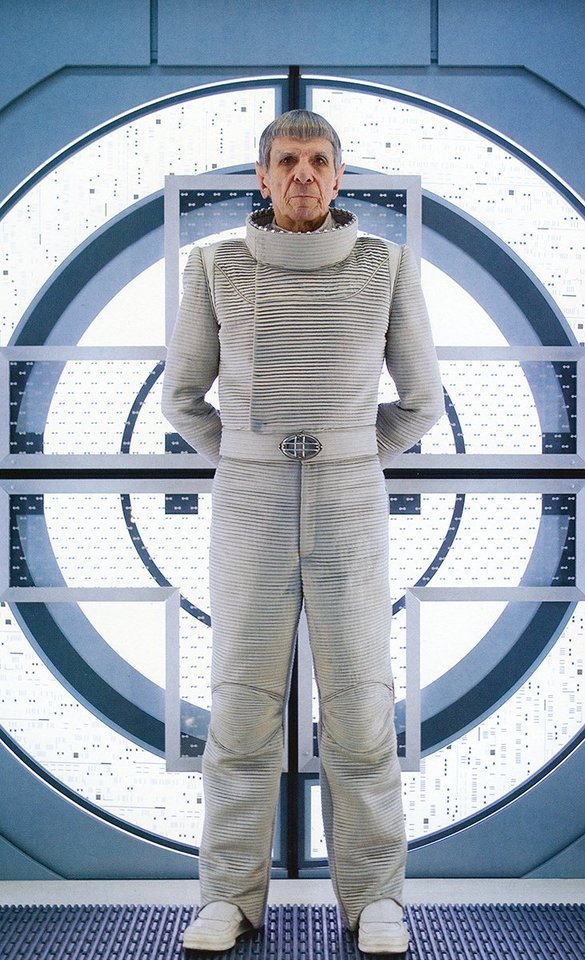
Fortunately all the Romulans had evacuated, as the government founded by Nero was more than willing to listen to Spock's warnings. Also as members of the Federation, all Federation worlds sent ships to assist.
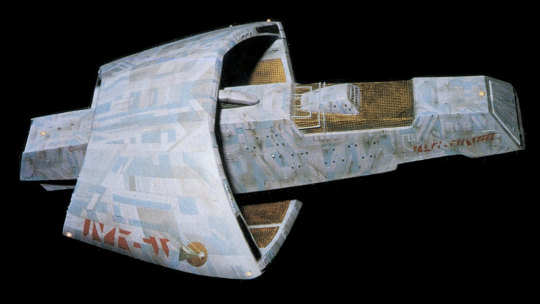
Nero’s mind snapped into pure rage at the loss of Romulus - his preprogrammed love of the world was at the very core of his being.

Spock's Red Matter device created a spatial rift that consumed the energy of the supernova wavefront, and saved the other worlds of the Romulan Free State.
Nero's pursuit of Spock would drive them both into the Rift.
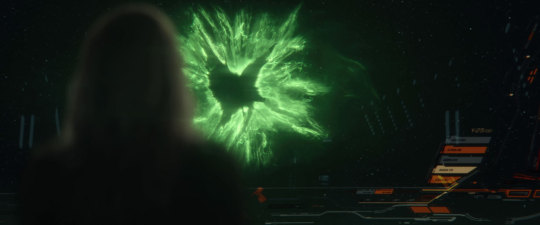
The USS Kelvin, commanded by Commodore George Kirk, encounters a spatial rift from which emerges a massive ship with spike blades extended.
The old ship is no match for the 24th Century powerhouse.
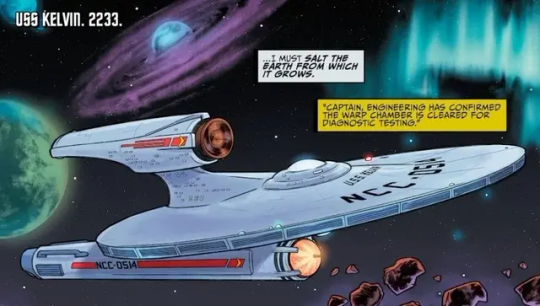

Nero vows that just as the twin worlds of Romulus have been destroyed, so too will the twin worlds of Spock - Vulcan and Earth.

Now the Enterprise, captained by Christopher Pike must engage this foe from the future.
Though the newly promoted first officer Jim Kirk is still reeling from the news of the loss of his father.
Kirk can only turn to the third in command, science officer Spock for help.

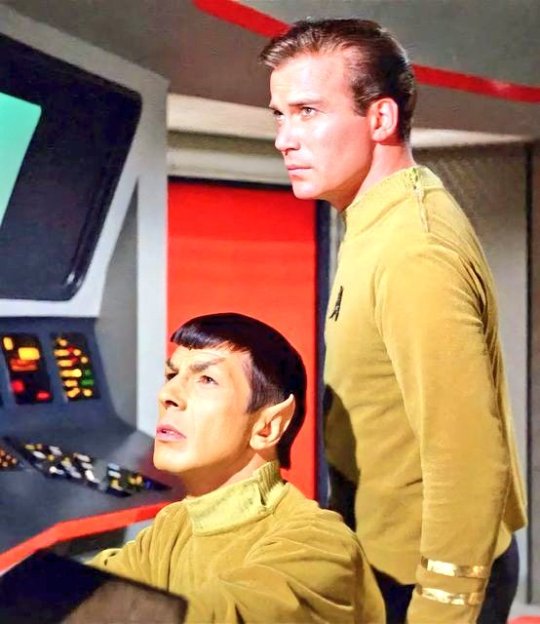
Cue opening titles

13 notes
·
View notes
Text
Myth of Aeneas
Mythological Connections between ancient Greece and Rome
The myth of Aeneas holds a central place in Roman cultural, religious, and literary traditions.
Aeneas, a Trojan hero and the son of the goddess Venus (Aphrodite) and the mortal Anchises, is celebrated as the legendary founder of the Roman people.
His journey from the ashes of Troy to the Italian peninsula is most famously recounted in Virgil's Aeneid, Rome’s national epic, which intertwines myth, history, and Roman values.
Aeneas symbolizes pietas (duty, loyalty, and devotion) and serves as a foundational figure legitimizing Rome’s origins, divine favor, and imperial destiny.
The myth not only connects Rome to the heroic age of Greek mythology but also establishes a narrative of divine providence guiding the Roman state's rise to power.
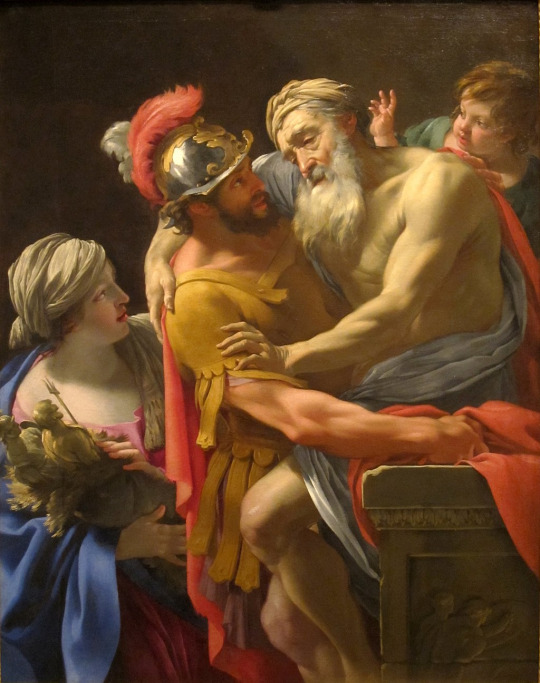
Aeneas in the Iliad
In Homeric tradition, Aeneas is a minor character in the Iliad, portrayed as a valiant Trojan warrior and the son of Aphrodite and Anchises.
Although overshadowed by Hector and other Trojan leaders, Aeneas is noted for his bravery and divine lineage.
Later Greek sources, such as Apollodorus and Euripides, hint at Aeneas escaping Troy after its fall. These accounts lay the groundwork for the Roman development of Aeneas as a wandering hero and the progenitor of a new civilization.
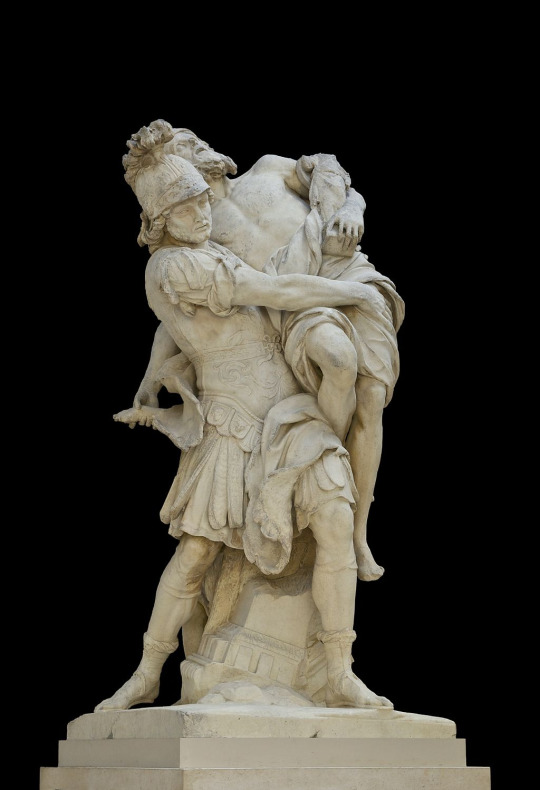
Aeneas' connection to Ancient Rome
Virgil’s Aeneid (composed between 29 and 19 BCE) provides the most comprehensive and influential version of the myth, solidifying Aeneas’s status as the legendary founder of Rome.
Aeneas leads a band of Trojan refugees across the Mediterranean, enduring numerous trials reminiscent of Odysseus’s wanderings in Homer’s Odyssey.
Aeneas lands in Latium, where he forms alliances with local tribes and prepares to fulfill his destiny.
Aeneas battles Turnus, a local prince, to secure his position as the forefather of the Roman people. The epic ends with Aeneas slaying Turnus, symbolizing the triumph of fate and divine will.
By linking Rome to Troy, the myth of Aeneas provided the Romans with a heroic ancestry, associating them with the legendary Trojan War and the Homeric tradition.
In ancient Roman culture and mythology, Aeneas is portrayed as the direct ancestor of Romulus and Remus, the legendary founders of Rome. His son Ascanius (Iulus) is identified as the forefather of the Julian family, connecting Aeneas to Julius Caesar and Augustus.
Additionally, Virgil uses Aeneas’s story to celebrate Augustus’s reign, drawing parallels between Aeneas’s mission and Augustus’s role in restoring order and prosperity to Rome after decades of civil war.
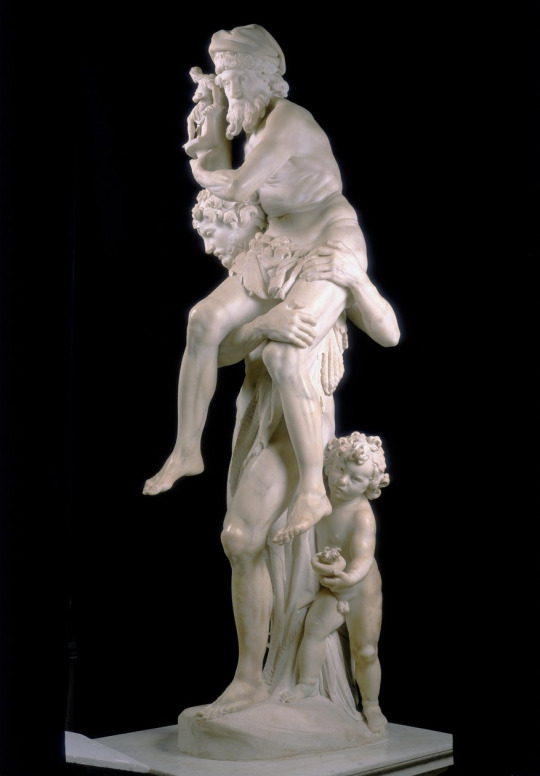
Pietas
In artistic depictions (whether it'd be statues or paintings) Aeneas is often depicted carrying his father (Anchises) and holding his son (Ascanius) as they flee from the destruction of Troy.
Anchises, is depicted as carrying the household gods (the Penates) while fleeing the burning city of Troy. This act symbolizes the preservation of Troy's sacred traditions and the continuity of its cultural and religious legacy
These actions exemplified the Roman's conception of pietas, the embodiment of Roman values and virtues. It encompassed reverence for the gods, honor for one's family, loyalty to the state, and service for one's people.
Veneration of Aeneas
Aeneas was honored in rituals and festivals celebrating Rome’s origins. Temples and altars dedicated to Venus Genetrix and other associated deities emphasized Aeneas’s divine lineage.
Augustus leveraged Aeneas’s myth to bolster his political and religious authority, promoting the idea that his reign was part of Rome’s preordained destiny. The Ara Pacis Augustae, a monumental altar celebrating peace under Augustus, includes imagery evoking Aeneas’s piety and mission.
7 notes
·
View notes
Text

MARS – When the Battery Runs Out
MARS – One of the oldest gods of Italy and Rome, originally leading the Roman pantheon (Jupiter, Mars, and Quirinus). God of war. Father of Romulus, the progenitor and protector of Rome. In Greek mythology, he corresponds to Ares. In ancient Italy, Mars was the god of fertility. It was believed that he could either bring about crop failure or livestock death, or prevent them. The first month of the Roman year, during which the ritual of expelling winter was performed, was named March in his honor. In many Romance languages, the day of the week Tuesday is named after Mars. Mars's wife was the goddess Nerio (Neriene), who was identified with Venus and Minerva.
In ASTROLOGY, MARS represents strength, assertiveness, aggressive sexuality, struggle, and rivalry. The planet's most important functions are protection, the instinct of self-preservation, and self-expression. At the forefront are standing up for one's own opinion, protecting personal interests in professional and social spheres, competition, and rivalry.
If, in a personal horoscope, the Sun and the Moon show the character of the personality, Mercury shows the mind and manner of speech, Venus shows the ability and need for love and partnership, then Mars represents the ambitions of the personality and inner energy. The zodiac sign in which Mars is located in the birth chart will indicate what kind of energy the planet is charged with, and the house of the horoscope in which Mars is located will tell through what the person will draw energy and inspiration, or on the resolution of which problems this energy will be most spent. Mars is one of the personal planets and participates in the formation of personal qualities. Positive aspects of the planet endow a person with courage, initiative, assertiveness, and a desire to express oneself brightly in activities. But an afflicted Mars turns a person into a conditional villain and egoist, creates quick fatigue and passivity, and such traits as hot-temperedness, aggressiveness, cruelty, despotism, masochistic and sadistic tendencies manifest in character and everyday life. It also indicates life-threatening situations, health problems, expressed in poor appetite, anemia, and a tendency to nosebleeds. Harmonious aspects direct the planet's energy into a constructive channel. In the family, order, trustful, and sincere relationships prevail. For the sake of satisfying their ambitions, a person is ready to work tirelessly, such a person is not afraid to experiment, and they are able to captivate others even with the most extravagant ideas. In personal life, positive aspects indicate freedom and openness. Mars reveals its highest energetic potential in aspects with Pluto, but whether this is good or bad will be told by the natal chart. Aspects with Uranus make Mars' energy swift and uncontrollable. Aspects with the Sun are considered favorable, even if they are tense, because challenges for Mars are a call to action and new aspirations. Mars feels constrained, complexed, and embittered in the sign of Cancer; its energy flares up sharply but also fades just as quickly. The planet can only be ignited through harmonious aspects and neighboring planets in the house, if there are any. Mars in the sign of Capricorn is the true ruler of its destiny; it possesses strategy and skillfully manages its energetic resources. It cannot be caught off guard, it strikes accurately and knows how to wait for the right moment. In Scorpio, Mars is like a volcanic eruption, it is unrestrained and constantly ready for action. Such an amount of energy is almost impossible to control. On one hand, the person is always charged with energy, but on the other hand, it can destroy them from within, exacerbating health problems and worsening already problematic situations. No matter what kind of energy the red planet is charged with, it represents a tool, internal or external, with which a person will go into battle to cope with life's challenges and how much and how long they will be able to withstand them.
4 notes
·
View notes
Text
Campania - Day 5
We got up at the same time as yesterday in order to catch the same train as yesterday, but did not ride it to the end of the line this time. Instead we disembarked a couple of stops outside Naples proper, because today was when we visited Pompeii.
If this is a ‘quiet’ time of year to visit, I dread to think what it must be like at the height of the tourist season, because even today it was hoaching with groups of students of many ages and nationalities, families both local and foreign with small children in tow, and many tour groups who were somewhat hazy on concepts like ‘leaving room for people to get past’.
We’d prebooked for here as well, so were able to collect our tickets and guidebooks from an office in the train station and go straight to the entrance, known as the Porta Marina (Sea Gate) of the city. Presumably, like the boathouses at Herculaneum, it was much nearer the shore in its heyday. The maps that came with the guidebooks were next to useless, however; they had the layout of the site down all right, but didn’t mark any useful details like toilets or cafes and half of the numbers marking specific locations within the city were printed in the wrong places. We must have spent half an hour just trying to find the Lupanar.
(Side note: if ‘Lupa’ is Latin slang for a lady of the night, this raises questions re: a double meaning in the story of Romulus and Remus being nursed by a she-wolf.)
We did, however, manage to pack in a decent overview of the site in our time there. To start things off, we walked to the far end of the site to see the Amphitheatre – the ring was inaccessible due to ongoing works, but it’s still an impressive building – and gradually worked our way back towards the Forum where we came in.
Pompeii has so many interesting little corners that they sort of run together after a while, but a few locations still stand out. Foremost is the Garden of the Fugitives, not far from the Amphitheatre. Most of the famous casts of the dead of Pompeii have been moved off-site, either into storage or to one museum collection or another, but this group have been left more or less in situ, sprawled across the ground in the corner of a quiet little orchard. One doesn’t, perhaps, get quite the safe sense of panic as from the crowds in the boathouses at Herculaneum, but it remains a poignant sight. One man in particular lies frozen forever in the act of trying to get up, illustrating just how quickly Vesuvius buried this place.
Nearby but a little more cheerful is the House of Julia Felix, an expansive villa with its own water feature right in the dining room. I find Julia Felix an interesting figure. Women who were wealthy in their own right, rather than dependent on a father or a husband, were not terribly common in Ancient Rome, but Julia clearly had a pretty good business going on running a local bathhouse and renting out shop space along the nearby street. I wonder what happened to her; whether she managed to get out of the city before the worst of the eruption or if she died with her neighbours. Maybe she’s one of the people in the Garden. Maybe she got on an ox cart and set up a new business in Rome. There’s probably no way to know from this far on in time.
Further over towards the Forum, past public bathhouses (several), bakeries (many) and thermopolia (ridiculously many – seriously, you could evidently make a good living running a food counter in Pompeii) is the city’s non-amphi Theatre. While this isn’t as big as the Amphitheatre, it’s a lot better preserved and is fully open to the public, letting you climb up to the stands. It’s not, however, the most impressive classical theatre I’ve visited, as Epidaurus in Greece and the ones I saw in Jordan nudge it a good few places down the list. Next door to the Theatre is something a bit more distinctly Roman: a colonnaded arcade around a wide courtyard, which served as the city’s gladiator barracks (and presumably their training school). Life as a gladiator wasn’t necessarily as bad as the films would have it – gladiators represented a significant investment, being expensive to train and house, so their deaths in the arena were something their owners tried to avoid if possible; they were kept well-fed and got top of the line medical care (at least by Roman standards, so still pretty grim) – but the little cells around the arcade do not strike me as particularly lavish accommodation. Maybe you got nicer furniture once you were a proven draw for the crowd. Some of their gear was displayed in the museum in Naples, though I don’t know if it was found here or over at the Amphitheatre.
Most of the city’s elaborate mosaics and frescoes have also been moved to the Naples museum for safekeeping, but a few remain in situ. I was particularly taken with the ‘Cave Canem’ (‘Beware of the dog’) warning in the House of the Tragic Poet, complete with a picture of a fierce dog on a lead (in case of illiterate burglars, I assume), and with a little shrine painted above the counter of one thermopolium.
I think you could spend weeks in Pompeii and not see everything, but we managed to get around most of the highlights. Curiously, while Pompeii is undeniably both impressive and fascinating, and offers as invaluable a window into daily life in Ancient Rome, I think I found Herculaneum more affecting. Part of this was probably just that Pompeii has fewer agonised skeletons lying around (not none, but fewer), but also that it’s so much bigger and busier a site that you feel more removed from what happened here.
Another, differently curious detail about Pompeii: it apparently doesn’t have much in the way of a gift shop. There may, for all I know, be a bigger one in the Antiquarium (which I’d hoped to see, but it was closed for some reason), but the only one we could find was rather small and not particularly well-stocked. They didn’t even have T-shirts. Still, I bought a fridge magnet and a pen before we caught the train back to Sorrento, where I got another couple of citrus-themed souvenirs and walked back up to the hotel.
(We did find the Lupanar eventually.)
2 notes
·
View notes
Text
*.·:·.☽✧ ✦ ✧☾.·:·.*
-Lunar and Luna-
*.·:·.☽✧ ✦ ✧☾.·:·.*
Lunar (female) and Luna (male), two puppet dolls turned sentient by an alchemist in order to test magic, discover new magic, modernize magic and revolutionize all of magic, creating a huge extravagant “neo” subtype of magic. Besides being test subjects, the two were supposed to be non-sentient as well as be able to not take a lot of damage to be available for constant magic intake, but that process didn’t succeed and made them close to humans in terms of sentience and durability in an uncanny way. These two creations were failures in his eyes however, and so he hid the twin brother and sister from the world in his underground house in order for them not to gaze at his disappointments. The alchemist tested magic onto these two puppets, and tested the limits of what magic is capable of without bothering if they would get hurt even if they were sentient.
Demonic magic was tested on the older twin, Lunar, and one of her arms was cut off entirely from her body one day as punishment for rebelling, and once a huge surge of unholy magic got forced into her, the magic corrupted her and was able to regrow her limb, however that limb was controlled by a high rank demon from the underworld, and the only times she was able to move it is when the demon wasn’t active. Her weapon became that arm from that day on.
Forbidden moon magic was tested on Luna, and when he was tested on, it was always specifically during the night when the magic intake can be powerful enough to cause injuries to his fragile doll body, causing many permanent burn scars. The one thing that his isolated life was able to offer was a scythe that was able to reap souls, that scythe came from the most ancient temples dedicated to worshipping demons, that now became his weapon. He got said weapon in the alchemist’s room once he and Lunar were able to kill that old man and escape their hell.
When the twins were tiny doll children, they had a very close bond, inseparable and did things together at all times. Their minds were in sync and they lived each day of their hellish lives being there for each other as they endured constant magic abuse. As time went on, they were able to realize how much of a hell their life is, and once they got used to their magic and were able to control it, they ended up murdering their creator and escaping their home to finally be free and inhale fresh air of the moon kingdom. However, as they lived up at the surface, they argued often over petty things before it started getting even more personal. As the twins got older, they started falling out and hating each other, realizing how much they don’t get along any longer, they left to go on their own ways, filled with hatred even if they used to consider themselves as best friends. Their constant hatred caused both of them to become worse people to others, becoming more neglectful and rude for Luna, whilst Lunar was more quick to be angered and always ditched other’s feelings.
(the twins’ story is inspired by the Roman myth of Romulus and Remus in terms of the falling out)
#oc#ocs#my ocs#oc lore#mayhem massacre#mm#lunar#lunar mm#luna#luna mm#symbolism#roman mythology reference#roman mythology
3 notes
·
View notes
Text
Lupercalia 2025
Dinos looked up from his papers. There it was again. What was that tapping sound. Was there a cat stuck at the balcony hoping to get in? It could be cold this time of year. He couldn't shake off the thought of a freezing animal at the door and so promptly got out of his chair. Dinos opened the doors. A swift cold breeze coming from the bosporus blew inside the study to play with his, carefully placed, notes. A shiver ran down his spine. More work. Where was that damned cat even? With further inspection he found some nuts on the balcony floor. Birds maybe? He looked up to the sky. Two dozen of seagulls coming from the North dived with great force to his right. They were wailing. In other times he would have took it as a bad omen. But that was, ofcourse, superstition from a dark past. He sighed.
"Down here!" dinos heard calling. He looked down the balcony. There at the street stood his brother, all naked, and that in this weather.
"Happy Lupercalia, Remus!"
Dinos prayed his brothers dick froze off.
"What are you doing?! Get inside, you fool" He hoped by shouting in the ancient tongue he wouldn't wake up the whole neighbourhood. For the Turks and Rûm had one thing in common; they sure loved to gossip and word traveled fast.
Romulus laughed. "I'm helping!"
Dinos rolling his eyes quickly went inside, shutting the doors behind him. Quick, quick down the green carpented stairs, the fifth and eleventh stare squeeked at him. Tip-toe he went past the boxes, carefull not to topple them down. And then, the locks. Five of them.
Keys. There was a fraction of a moment of pure panic before he found the keys, right where he expected them to be, secured and safe.
Romulus met him with a smile "That took you long" he mocked him
"Get in you" Dinos ordered him
"Nah, Are you insane?! Can't you tell I'm on a mission. Please come out?"
Dinos out of breath just sat down at the stairs and begged his brother to sit with him. Which he did.
"Look Romulus... I think that I know what it is you want. But, I don't want that. And I belief it is my call, not yours" "I only want to help" Romulus argued. "Yes, about that. You can help by letting me finish talking." Romulus bit his tongue. It was really hard, Dinos could tell. "Thank you. Let me explain... You want to help by blessing my people, welcoming new life and hope. You are... quite literally... freezing your sack off... for me" Romulus nods "Yes, the thing is. I'm tired. I WANT to retire. I'm sorry, I don't know how to explain" "I can help" Dinos sighed. Romulus took his hand into his. They felt cold at the touch. Then he helped him up and inside. Dinos sighed in relief now no one was there to see his brother, in all his glory.
"Remus, now YOU listen to me. I once was where you are now. I'm talking from experience allright? You can make the call ok. But I need you to focus. You got too much things going on thats just... You got to get your priorities straight now. This stuff here... it's not important. We will figure out what IS important. I will help you with that. Ok? If you want to retire. Than I'll help you with that." "Thank you" "I'll help you militairy style though... this pussy attitude brought you nothing but an apartment full of crap. Give me your phone." "Wait what?"
Romulus grabbed his phone and went to his contacts. "... Sup Herakles. Listen up. Get your ass on the next flight. Your uncle is gonna 'UNALIVE' himself. That's a nice way of saying 'it'll take three men five days to clean the carpet'. No sorry. Focus boy. If you are late, he's gone: much drama, lots of paperwork. Nice talking to you" Dinos watched in shock as Romulus flushed his phone down the toilet and then dropped on the sofa looking ready to collect the noble price for his act of kindness.
4 notes
·
View notes